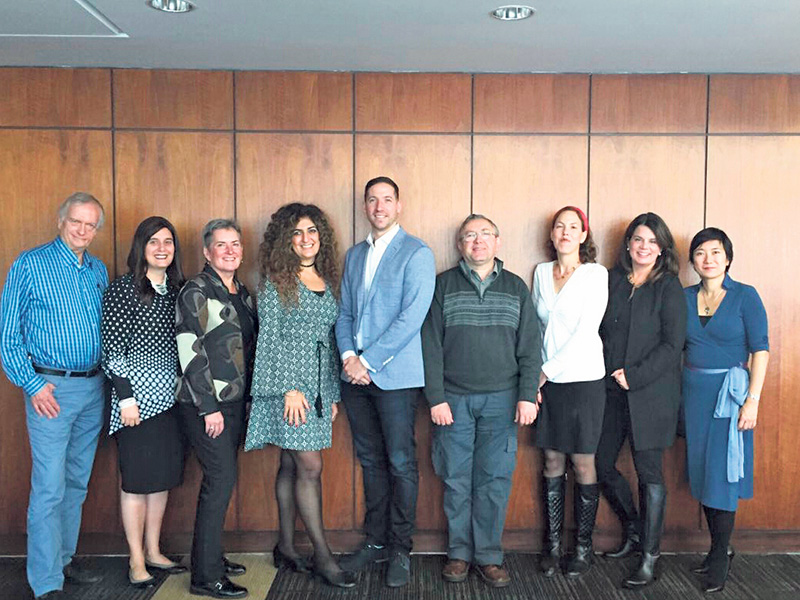The latest Canada-Israel collaboration will launch Israel’s first academic program in the cutting-edge field of health informatics.
“The goal is to raise the quality of care in Israel and to improve the status of nurses,” said Sigal Shafran-Tikva, who will direct the program at the Jerusalem College of Technology, sometimes known by its original name, Machon Lev. “We’re bad on process – we don’t plan. This program will give the tools how to plan, how to do with minimal mistakes. This will make care faster and more efficient.”
Organizers also hope nurses will learn to talk the same language as technical professionals, said Moriah Ellen, a JCT senior lecturer, originally from Toronto, who has organized the project. Ellen’s mother, Judith Shamian, president of the International Council of Nurses and a JCT board member, first proposed the health informatics program.
Shafran-Tikva and Ellen were two of four JCT representatives who visited Toronto last week to see first-hand the program that will serve as the school’s model: the University of Toronto’s Institute of Health Policy, Management and Evaluation (IHPME).
“Health informatics” sounds more suited to the ivory tower, and even its practitioners struggle to define the evolving field. But it promises practical benefits.
“Health informatics bridges processes and people in technology in health care and technology in a way that will advance health care,” said Julia Zarb, program director of the master’s program at the IHPME.
For Ontario residents, the easiest reference point for the field is the eHealth Ontario spending scandal of 2009, which revealed that the government’s attempts to digitize medical records had stalled, consuming $1 billion in the process.
The province has made progress since then, with about 80 per cent of family doctors adopting electronic records. But the Israeli health system is more advanced, with almost 100 per cent penetration.
Combine that enviable mark with Israel’s innovation edge, and the country’s current deficit in health informatics programs is hard to figure. U of T’s program, introduced in 2009, is one of six in Canada. The United States boasts many more, and countries around the world also offer degrees.
“I can’t really tell why there are no academic programs in health informatics in Israel,” said Aviv Shachak, an associate professor at the IHPME who studied in Israel. “It may just be that no academic institution has taken the initiative. There is some very good research in the field with some world-renowned researchers.”
Individual courses can be found, too, but scattered throughout course listings, much like Canada’s situation years ago.
“I am self-taught,” said Lynn Nagle, assistant professor at U of T’s Lawrence S. Bloomberg Faculty of Nursing and cross-appointed to the IHPME. “When I did my PhD, I had put together a course of study from various courses.”
Slated to launch in March, JCT’s health informatics program will initially offer a certificate. Graduate studies will be added in five years, pending approval from Israel’s council for higher education. Students will simultaneously be employed full time and will meet once a week for 27 weeks – 21 in class and six of practicum.
The program will be part of JCT’s nursing program in its School of Life and Health Sciences. Professors will hail from nursing, computer science, management and engineering.
While the IHPME has collaborated with other institutes of higher learning, the JCT partnership is its deepest to date, and the first time it has helped build another program, openly sharing syllabi and advice both before and after the program begins.
“We wanted to make sure the values were consistent between the two institutions,” said IHPME director Adalsteinn Brown, who will visit Israel in February. “This experience gives us confidence that we can pursue other partnerships as well.”
U of T researchers will benefit, and “teachers and students may move back and forth… We hope to understand what works really well in Ontario and what works really well in Israel,” said Brown, a former assistant deputy minister at the Ontario Ministry of Health and Long-Term Care.
For Canadian supporters of JCT, the program offers concrete results.
“Donors are interested in not just writing a cheque,” said Larry Krauss, chair of the Canadian Friends of JCT. “This collaboration not only helps the institution, but ultimately improves health care for everyone in Israel.”
